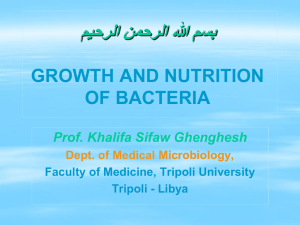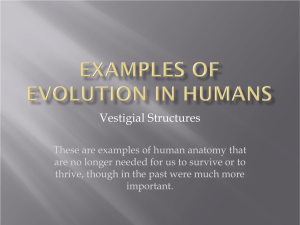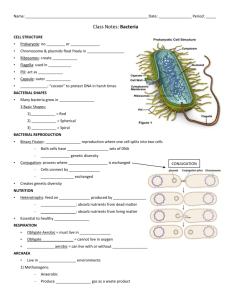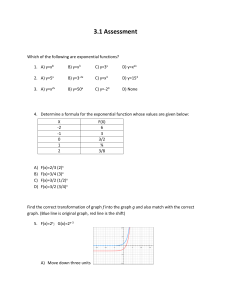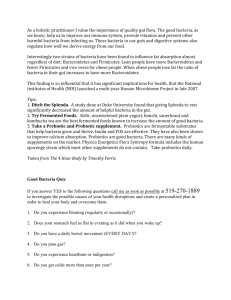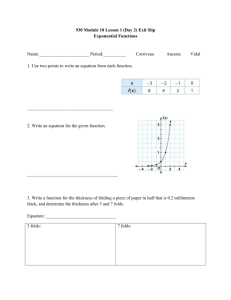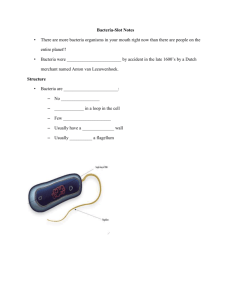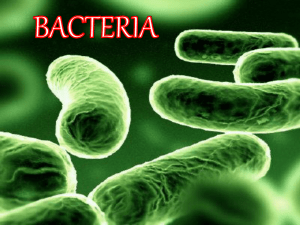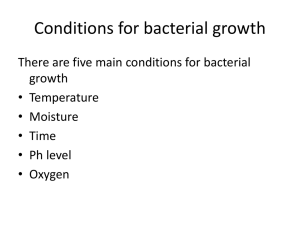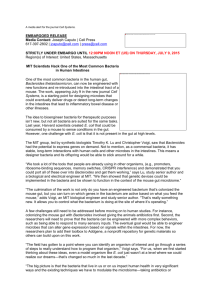Career Connection
advertisement
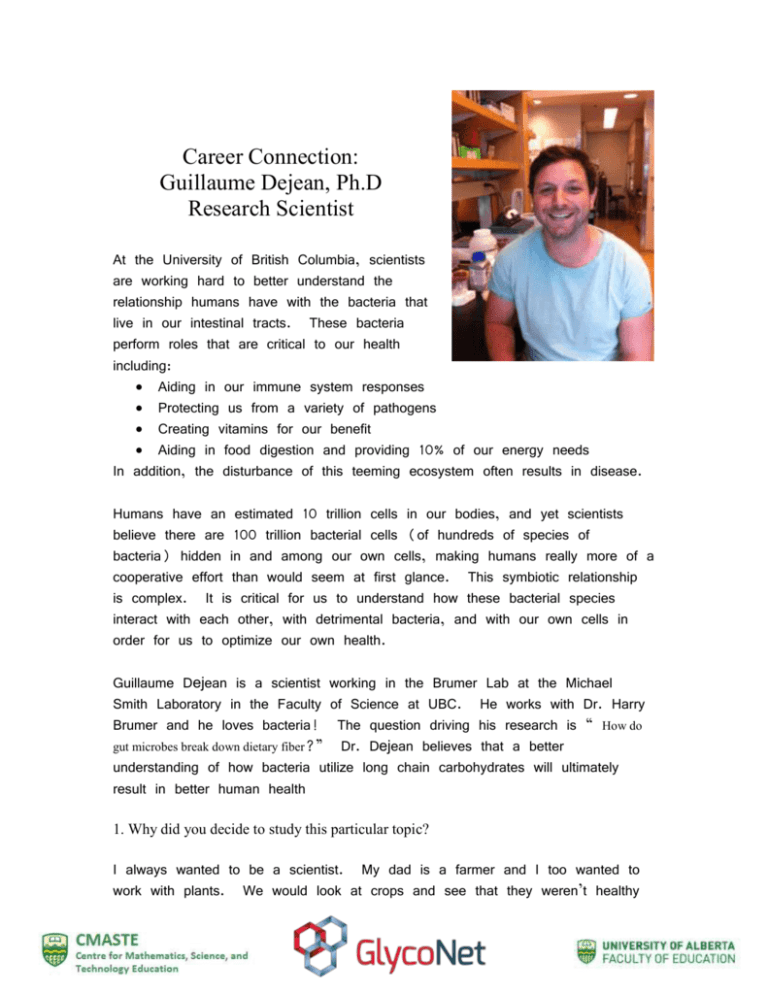
Career Connection: Guillaume Dejean, Ph.D Research Scientist At the University of British Columbia, scientists are working hard to better understand the relationship humans have with the bacteria that live in our intestinal tracts. These bacteria perform roles that are critical to our health including: Aiding in our immune system responses Protecting us from a variety of pathogens Creating vitamins for our benefit Aiding in food digestion and providing 10% of our energy needs In addition, the disturbance of this teeming ecosystem often results in disease. Humans have an estimated 10 trillion cells in our bodies, and yet scientists believe there are 100 trillion bacterial cells (of hundreds of species of bacteria) hidden in and among our own cells, making humans really more of a cooperative effort than would seem at first glance. This symbiotic relationship is complex. It is critical for us to understand how these bacterial species interact with each other, with detrimental bacteria, and with our own cells in order for us to optimize our own health. Guillaume Dejean is a scientist working in the Brumer Lab at the Michael Smith Laboratory in the Faculty of Science at UBC. He works with Dr. Harry Brumer and he loves bacteria! The question driving his research is “ How do gut microbes break down dietary fiber?” Dr. Dejean believes that a better understanding of how bacteria utilize long chain carbohydrates will ultimately result in better human health 1. Why did you decide to study this particular topic? I always wanted to be a scientist. My dad is a farmer and I too wanted to work with plants. We would look at crops and see that they weren’t healthy [Type text] [Type text] and my dad would say, “Maybe there is a lack of iron and so they look this way.” This fascinated me. There is a lot of potential in this research. Among all the factors that determine the human colon microbiota composition, diet is an important one. Understanding this relationship at a molecular level is crucial to describe the gut microbial ecology and evolution. Moreover, an important thing is the elucidation of the enzymes acting on our diet. If we can understand the enzymes involved, maybe we can use these to one day create biofuels. For example, we do not understand very much about utilization of algae carbohydrates. They could be an important source of biofuels. Maybe we will find new enzymes and will be able to translate this understanding to other applications. We must increase our understanding of our diet, and the manipulation of it and the microbiome in our intestines. By working on the gut we can translate this to other applications. Who knows what the possibilities could be?! 2. Can you summarize your research project? I am working on finding the method by which bacteria break down long chains of carbohydrates. There is a complex ecosystem within our intestines. Some bacteria break down long chains and only use short sections of those carbohydrates. What happens to the rest of the chain? It is likely that other bacteria use those sections, but I am trying to determine that with certainty. We know that we (well, really the bacteria in our intestines) respond quickly to dietary changes. We also know that the human genome only encodes for a tiny number of enzymes to break apart oligo- and polysaccharides. There are hundreds of bacterial species that use the rest of these carbohydrates as a carbon source and ferment them to form short chain fatty acids. I want to figure out this process in as much detail as possible. Particularly exciting in the context of human nutrition and health, this research will reveal ecological niche signature enzymes in the gut environment and highlight the genetic basis of adaptation to specific diets across different human populations, defining specific genes as molecular markers. 3. Why is it important for the average Canadian to support the work of professional scientists? I know it seems like some of this work doesn’t have direct application, but doing research is like building a house. You need to build a foundation to [Type text] [Type text] get to the roof. If the roof is new drugs, or solutions to problems, research is the foundation. We can never know what can happen when we study science. It is possible that organisms in Antarctica can have applications in fighting disease. For example the discovery of a TAQ-polymerase enzyme isolated from a thermophilic bacterium (Thermus aquaticus) living in hot springs in 1976 drastically improved the Polymerase Chain Reaction (PCR) method. It is a molecular method used in all the laboratories worldwide today and is daily used to help identify and diagnostic several diseases. We just don’t know all the benefits that can come from seemingly irrelevant research. 4. What are the next steps in your research? I want to decipher the evolution of enzymes and describe this system in great detail. I would like to write equations for the degradation of beta-glucans. My next steps are to study the other bacteria in the gut and the network of bacteria. It is a complex ecosystem that works together. Bacteria are interacting with each other, but also with the host (us) and everything is under the control of our diet. Microbes are struggling to get the optimal environment for their own survival. It is like a living city inside us. 5. What does a typical day look like for you? I drink lots of coffee! Typically I will come to the lab at 8:30am and stay until 7 at night. These are long days! Some days we have experiments to do, other days are busy with literature review, and thinking about what are going to be the next steps. When you think about scientists in labs, that is us; we do lots of experiments. Every week we meet with our Principal Investigator and discuss the latest results. We will talk about things that went well and other things that did not! We figure out the problems to solve. Tutoring students is also important. I tutored three people. One is a grad student, and two are under-grads. Presenting data is also really important and I will sometimes hold seminars within the building to present the work I am currently doing. 6. How can I become a research scientist? [Type text] [Type text] Find out what you like; it’s important to study what you like. My path to UBC started in France. First, I earned a B. Sc., then a Master’s degree in Plant Science and Microbiology. I went on to get Ph. D. If you are curious and a hard worker then maybe a Ph. D is possible for you. It is important to find out what your future career is really like. Try to shadow a scientist and find out what it is like. I have completed eight years of school, after completing high school. One day it would be nice to be a professor. Research is sometimes stressful. Careers in science do provide opportunities for travel. I can go around the world to see what the research is in different places. I can attend conferences and talk with scientists all over the world and see their solutions to problems, and learn new techniques. I would like to visit other universities and see what their challenges are, for example in Africa. How are they doing research there? How do they solve problems? I am sure it is different than in Canada and we can learn from them as we can help them out to improve some aspects of their research. Further Learning 1. 2. 3. 4. How do intestinal bacteria benefit humans? Why are intestinal bacteria a necessity for human health? Write a diagram for the degradation of carbohydrates. Why does Dr. DeJean compare scientific research to the foundation of a house? 5. How does our diet influence the microbiome in our intestine? [Type text] [Type text]
